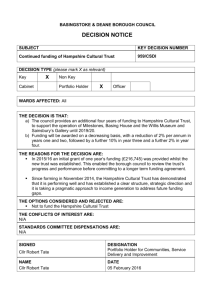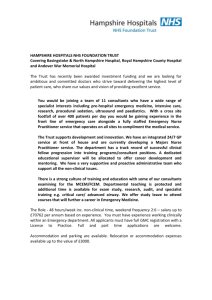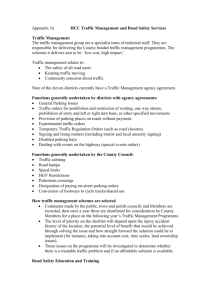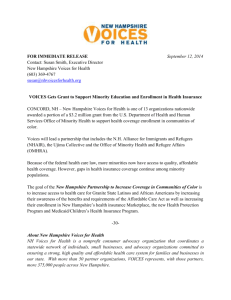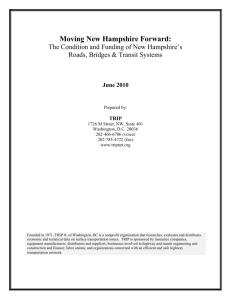View/Download Press Release
advertisement
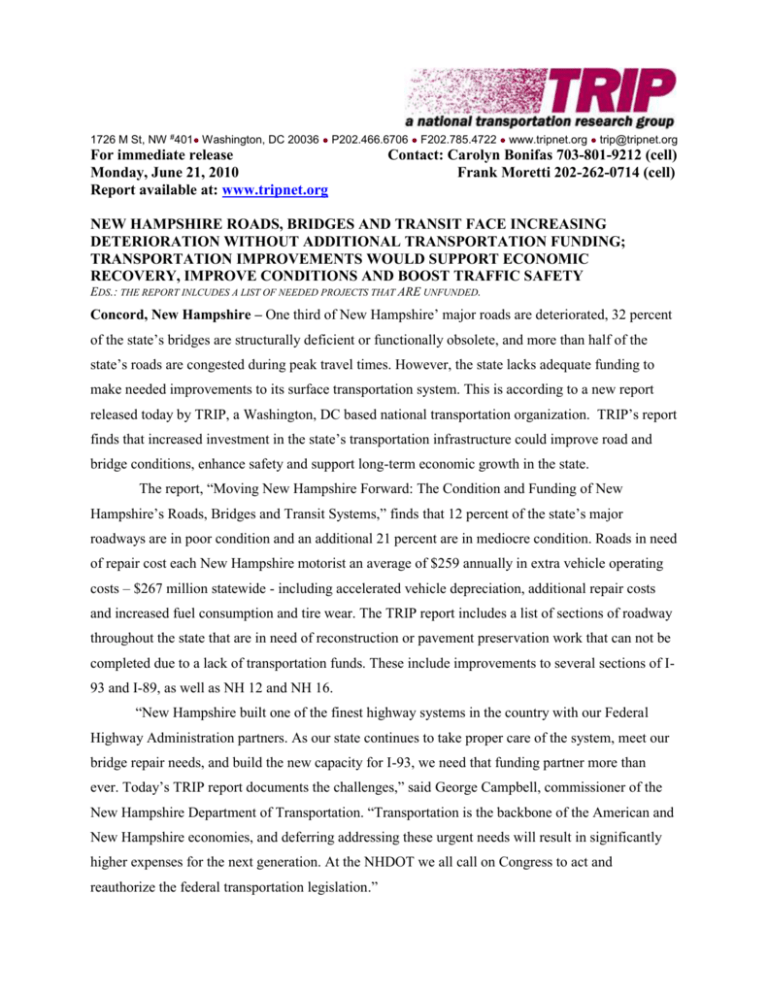
1726 M St, NW #401● Washington, DC 20036 ● P202.466.6706 ● F202.785.4722 ● www.tripnet.org ● trip@tripnet.org For immediate release Monday, June 21, 2010 Report available at: www.tripnet.org Contact: Carolyn Bonifas 703-801-9212 (cell) Frank Moretti 202-262-0714 (cell) NEW HAMPSHIRE ROADS, BRIDGES AND TRANSIT FACE INCREASING DETERIORATION WITHOUT ADDITIONAL TRANSPORTATION FUNDING; TRANSPORTATION IMPROVEMENTS WOULD SUPPORT ECONOMIC RECOVERY, IMPROVE CONDITIONS AND BOOST TRAFFIC SAFETY EDS.: THE REPORT INLCUDES A LIST OF NEEDED PROJECTS THAT ARE UNFUNDED. Concord, New Hampshire – One third of New Hampshire’ major roads are deteriorated, 32 percent of the state’s bridges are structurally deficient or functionally obsolete, and more than half of the state’s roads are congested during peak travel times. However, the state lacks adequate funding to make needed improvements to its surface transportation system. This is according to a new report released today by TRIP, a Washington, DC based national transportation organization. TRIP’s report finds that increased investment in the state’s transportation infrastructure could improve road and bridge conditions, enhance safety and support long-term economic growth in the state. The report, “Moving New Hampshire Forward: The Condition and Funding of New Hampshire’s Roads, Bridges and Transit Systems,” finds that 12 percent of the state’s major roadways are in poor condition and an additional 21 percent are in mediocre condition. Roads in need of repair cost each New Hampshire motorist an average of $259 annually in extra vehicle operating costs – $267 million statewide - including accelerated vehicle depreciation, additional repair costs and increased fuel consumption and tire wear. The TRIP report includes a list of sections of roadway throughout the state that are in need of reconstruction or pavement preservation work that can not be completed due to a lack of transportation funds. These include improvements to several sections of I93 and I-89, as well as NH 12 and NH 16. “New Hampshire built one of the finest highway systems in the country with our Federal Highway Administration partners. As our state continues to take proper care of the system, meet our bridge repair needs, and build the new capacity for I-93, we need that funding partner more than ever. Today’s TRIP report documents the challenges,” said George Campbell, commissioner of the New Hampshire Department of Transportation. “Transportation is the backbone of the American and New Hampshire economies, and deferring addressing these urgent needs will result in significantly higher expenses for the next generation. At the NHDOT we all call on Congress to act and reauthorize the federal transportation legislation.” In addition to deteriorated road conditions, 16 percent of New Hampshire’s bridges are structurally deficient and an additional 16 percent are functionally obsolete. The state’s roads are also becoming increasingly crowded, as commuting and commerce are constrained by growing traffic congestion on New Hampshire’ major urban roads. In 2008, 51 percent of the state’s urban highways were congested during peak travel times. The TRIP report contains a list of needed transportation projects throughout the state that would repair and replace deficient bridges, increase roadway capacity and improve the state’s transit system. However, these projects can not move forward without additional transportation funding. “The TRIP report findings validate why the state established the Commission to Study Future Sustainable Revenue Sources for Funding Improvements to State and Municipal Highways and Bridges. Current state funding is inadequate to keep up with routine maintenance, let alone finish widening I-93 and construct other needed new transportation projects. Transportation is jobs – construction jobs and the moving of goods and services. It is imperative that Congress do its part and adequately fund surface transportation with a timely and predictable program,” said state representative Candace Bouchard. Last year’s federal American Recovery and Reinvestment Act provides approximately $129 million in stimulus funding for highway and bridge improvements and $13 million for public transit improvements in New Hampshire. This funding has served as an important down payment on needed road, highway, bridge and transit improvements but is not sufficient to allow the state to proceed with numerous projects needed to modernize its surface transportation system. The federal surface transportation program, which expires on December 31, 2010, remains a critical source of funding for road and bridge repairs and transit improvements in New Hampshire. It will be critical that Congress crafts and approves a new federal surface transportation program that could include a significant boost in funding for highway and transit improvements in New Hampshire. “While the state has put a combination of federal and state funds to good use in the past, in the coming years, many additional needed projects will remain stranded on the drawing board because of insufficient funding,” said Will Wilkins, executive director of TRIP. “It is critical that the state adequately fund its transportation system and that Congress produces a timely and adequately funded federal surface transportation program. Thousands of jobs and the state’s economy are riding on it.” -30-
